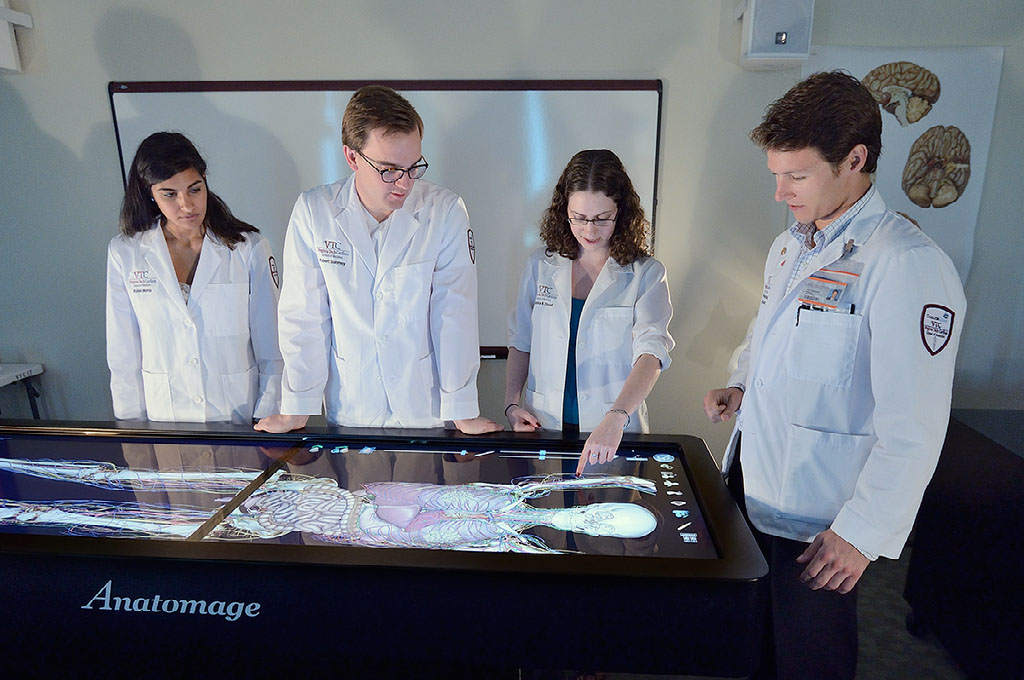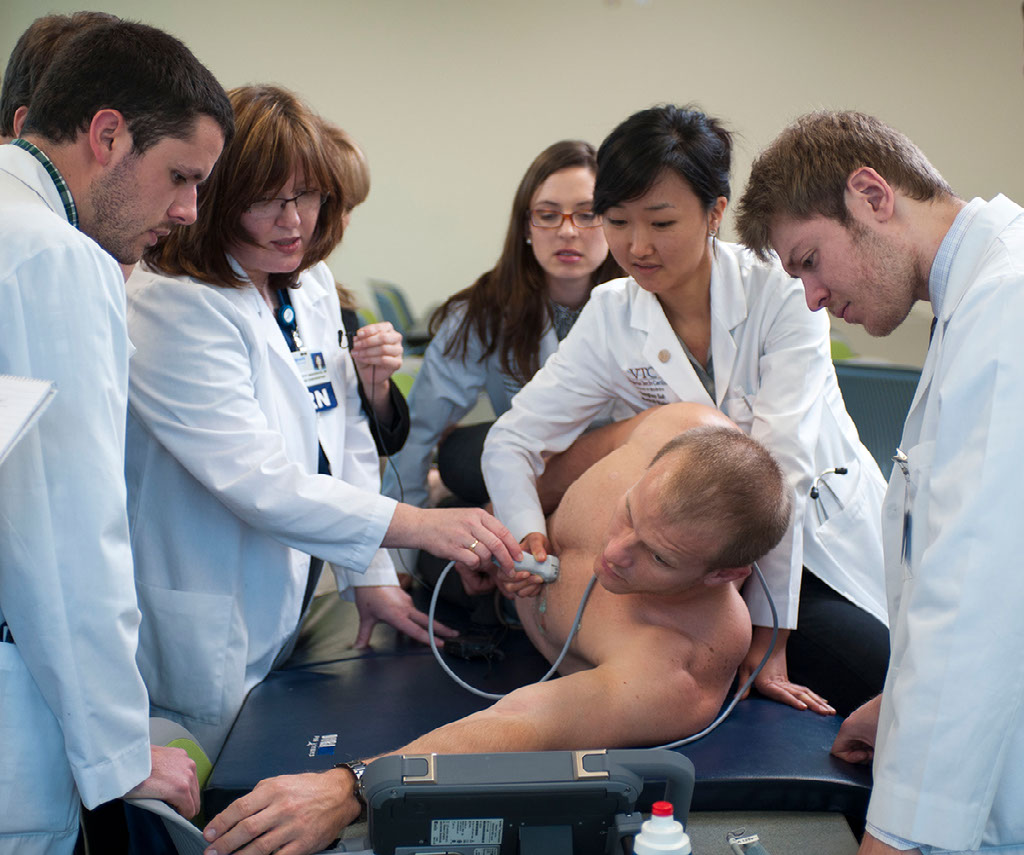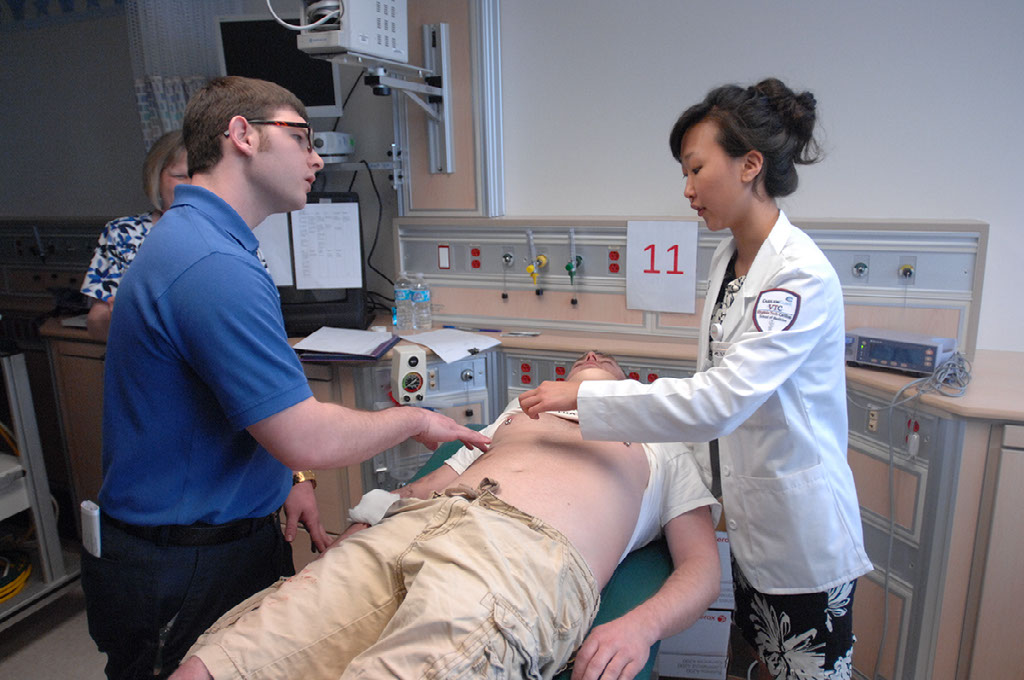The Four Value Domains VIRGINIA TECH CARILION SCHOOL OF MEDICINE’S COMMITMENT TO EXCELLENCE
The Virginia Tech Carilion School of Medicine not only provides exemplary training in the basic and clinical sciences, but it also transcends the traditional medical education model by providing a solid foundation in research and interprofessionalism. The school teaches its students to be lifelong learners and gives them the tools they need to excel in any field of medicine. To achieve these goals, the school pursues four value domains: Basic Science, Clinical Science, Research, and Interprofessionalism.
Basic Science
The teaching of basic science is fundamental to any medical school curriculum—yet the Virginia Tech Carilion School of Medicine model transcends the traditional approach. Students are expected not just to learn in lectures, but also to be active participants in the process. They use problem-based learning in small groups to master basic science across body systems.

Each week students explore real patient cases from the community. The students work together in small groups with a facilitator to pull out learning objectives from the case. Mid-week, the groups meet again and present what they have learned, in effect teaching one another.
After those presentations, the groups receive more details about the case. They again extract learning objectives and present their investigations at the end of the week. After the final presentations, students meet the actual patient, the doctor involved in the case, and the patient’s family members, to learn from them the full impact of the patient’s medical condition in a memorable way.
Patient-centered learning reminds students that the science they are learning relates to the diagnosis and treatment of real patients. It also teaches them to make patients the central focus of their professional practice.
Clinical Science
At the Virginia Tech Carilion School of Medicine, clinical science begins with real patients—and in the first week of school. Students participate in the Longitudinal Ambulatory Care Experience program, or LACE, which allows them to incorporate skills learned in the classroom into clinical settings. This program provides students with real clinical experience, physician role modeling, interprofessional relationship building, and a demonstration of the continuity of patient care.

The first two years of the clinical science value domain also incorporate lectures, panel discussions, reflective exercises, and simulation laboratories. Students receive ample time to learn and practice clinical skills with faculty and standardized patients in a suite of on-site examination rooms.
A feature of the Virginia Tech Carilion School of Medicine program not offered in most medical schools is the administration of clinical skills exams following each block of study during the first two years. This practice ensures a progressive development in clinical skills mastery. In addition, students benefit from two programs found in only a handful of medical schools nationwide: portable ultrasound training and a comprehensive oral health curriculum.
These early, intensive clinical experiences prepare students not just for their clinical clerkships and elective rotations, but also for national board exams.
Research
At the Virginia Tech Carilion School of Medicine, research is threaded through all four years of study. The school dedicates more than 1,200 hours of its curriculum to research—and it shows. In just the past two years, dozens of Virginia Tech Carilion School of Medicine students have presented at national and international conferences and been published in prestigious scientific journals.
Before graduation, each student is required to complete a hypothesis-driven research project and write a paper of publishable quality. Students are provided with the essential tools and talented mentors needed to complete their projects, and they take inspiration from the leading physician–scientists who visit the school to discuss state-of-the-art research.
The first year focuses on research instruction to ensure students have the tools they need to complete their projects. Once students identify an area or mentor of interest, they begin discussions with faculty members about the nature and scope of the proposed project.
Student select their projects between their first and second years. A seven-week block of unscheduled time is built into the schedule to allow them to begin their research. Between years two and three, students are able to use portions of a 14-week block to do the bulk of their experiments and data collection. Data analysis is completed by the beginning of the fourth year so students can commit enough time to the writing of a manuscript of publishable quality.
Interprofessionalism
Interprofessionalism at the Virginia Tech Carilion School of Medicine is the study and practice of health care provider roles, especially those of doctors, nurses, and physician assistants. The goal is to have students in the various professions learn to work together and respect one another’s roles in health care early on, so when they join clinical settings, they can work more effectively as a team to improve patient outcomes.

The Virginia Tech Carilion School of Medicine was the first medical school in the country to integrate interprofessionalism across the entire curriculum. The groundwork is laid during year one, with the Interprofessional Leadership Course, which also includes nursing, physician assistant, and allied health students from the Jefferson College of Health Sciences. Interprofessionalism knowledge and skills are developed around personal reflection, conflict resolution, and successful teamwork. Students also investigate the roles, responsibilities, and biases of the different health care professions. In addition, students work in interprofessional teams to perform a community service project.
In their second year, students focus on ethics, legal issues, and medical humanities as they relate to interprofessionalism. They also participate in experiential learning as part of interprofessional health care teams. When students undertake clinical rotations in their third and fourth years, they continue to participate in health care team experiences, and their clerkship evaluations incorporate an assessment of their interprofessional skills.
